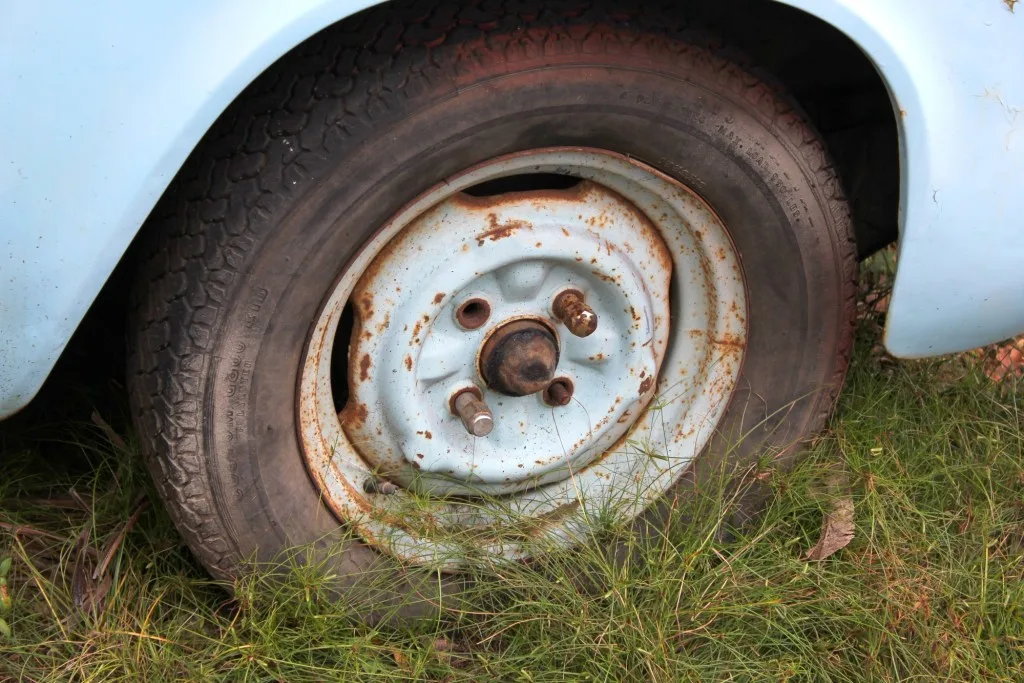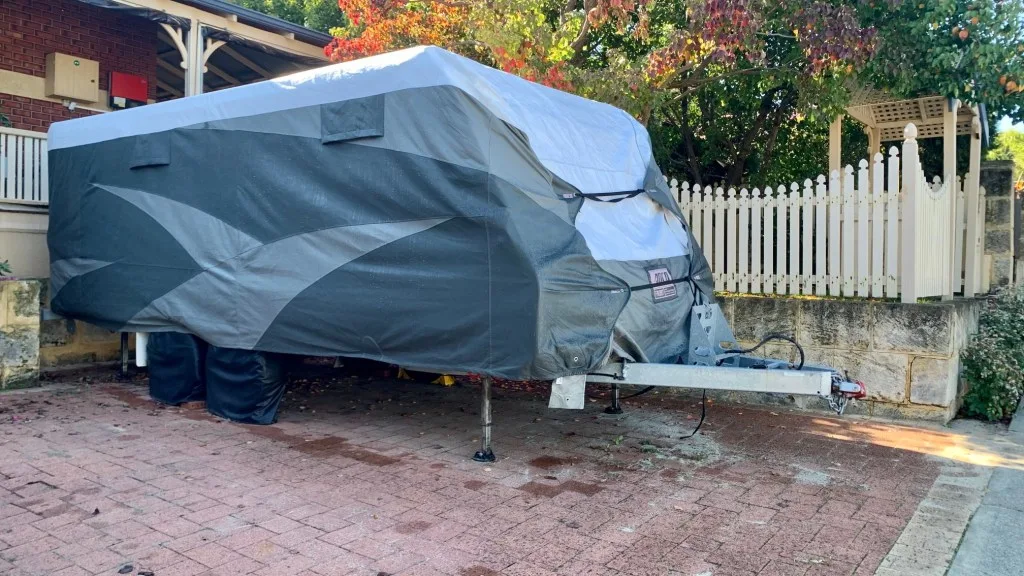We’ve all seen the roadside storage lots with old motorhomes rotting and decaying. Does it matter if they stored their RV with no cover or with one?
We took a deep look at the dangers of leaving your RV unprotected.
Let’s jump in!
Should RVs Be Stored Outside with No Cover?
No, we don’t think you should store your RV outside with no cover. At least not for extended periods. Leaving your RV exposed to the elements can cause damage and cost you a lot of money in the long run.
Whether you choose an RV cover or a covered storage option, you should protect your RV while it sits in storage.
What Does an RV Cover Do?
RV covers typically consist of polyester or polypropylene fabric reinforced at the seams. Some have multiple layers on the roof for added protection. Here are the main benefits of RV covers.
Protects from UV Rays
RV covers protect your rig from harmful UV rays. Even if you don’t get a lot of rain or storms where you live, UV rays can be damaging.
UV rays from the sun fade the exterior paint and interior fabrics and damage the seals on your RV, making them brittle and prone to cracking and leaking.

Protects from Leaks
An RV cover prevents any leaks from rain or snow through cracks or broken seals. You might not even know you have leaks until it’s too late, but an RV cover will prevent that from happening.
Protects from Dirt and Dust
RV covers keep your RV cleaner longer. Your RV will look just as shiny and clean when you take off the cover as the day you put it in storage.
Dangers of Leaving Your RV Outside with No Cover
It’s perfectly fine to store your RV for short periods with no cover. But if you’re a seasonal RVer, you should know the dangers of leaving your RV unprotected.
UV Damage to Seals and Seams
UV rays can damage seals and seams all over your RV, from the rooftop to the windows. You may not notice the damage immediately, but it can cause issues down the road.

Tire UV Damage and Dry Rot
UV rays are also harmful to tires. With no cover, the sun can cause dry rot in RV tires. Dry rot is dangerous because it’s not always visible to the naked eye. This can cause blowouts as well.
Pro Tip: Without wheels you won’t be getting far. Learn more about how to keep your tires rot free: Do RV Tire Covers Really Work?
Leaks in Roof and on Windows
When it rains and snows, water will get into your RV through any crack or pinhole it can find. You might not even know that you have a small crack or pinhole, but if you leave your RV to the elements all winter (or summer), you might be coming back to some pretty nasty water damage.

Water Damage and Mold
Water damage occurs when rainwater or snowmelt leaks into an RV. It usually starts at the roof and travels down the walls before getting into the floor. Water damage can cause the floor to collapse, and it can create toxic mold growth. Water damage is a silent threat for RVers; we rarely detect it until it’s way too late especially if you store your RV with no cover.
Sun Bleaching on Decals and Interior
The last danger of storing your RV uncovered is purely aesthetic. Sun rays can bleach your RV paint or decals. The sun can also get through the windows and bleach fabrics. Whether that’s carpet, curtains, or upholstery, the sun can be really damaging.
How to Store Your RV Safely
Storing your RV safely doesn’t have to cost an arm and a leg, even if you have no RV cover for it. Here are the best ways to store your RV to protect it from the elements.

RV Garages
If you have an RV garage, you’re probably already using it. RV garages are like car garages at your house, but they’re made for an RV instead.
RV Storage Units
There are RV storage places in almost every town and city across the U.S. You can choose covered parking, uncovered parking, and more. Some RV storage units have climate-controlled interior parking for long-term RV storage, like at National Indoor RV Centers. Other RV storage places have protected parking bays with electric and water hookups.
Keep in Mind: Not all storage facilities are created equal. Let’s compare which RV Storage Facilities are Decent, Better & Best
RV Covers
RV covers are a great option if you’re parking your RV in your driveway or an uncovered storage lot. You can purchase an RV cover in many places, like Amazon. RV covers are the most economical option, and you can use them over and over.
Save Yourself Money by Protecting Your RV
Snow, ice, wind, sun, and rain all pose a threat to your RV when you park it in long-term storage. Nobody wants to deal with damage from the elements.
If you don’t want to spring for covered RV storage, an RV cover is a small investment up front to save yourself a lot of money in potential repairs down the road. How do you store your RV?
We’ll Help You Find the Best Free Camping in the USA
You should give it a try!
As a matter of fact, these free campsites are yours to enjoy. Every time you pay federal taxes, you’re contributing to these lands.
Become a FREE CAMPING INSIDER and join the 100,000 campers who love to score the best site!
We’ll send you the 50 Best Free Campsites in the USA (one per state). Access the list by submitting your email below: